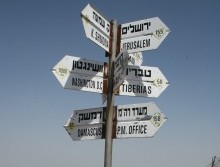
Regional fight? The battle with ISIS is across the Middle East and growing hotter. Middle East educational sign post showing distance between major locations. Illustrative. By Joshua Spurlock
Syria is so bad the bad guys are fighting worse guys and now not everyone on the “good side” is happy even when the good guys have success against the bad guys. It’s a hodge-podge of turmoil and terror, impacting virtually the entire region. It’s not just that three or four other nations are touched—the bigger question is who’s not?
Here’s a rundown of some of the biggest trouble in Syria, and why it shouldn’t distract from the bigger goal of defeating ISIS.
Iranian Meddling
Iran has long been involved in Syria, suspected of pumping weapons and experts into Syria to try and save their ally there, the Bashar al-Assad regime. But a recent article in The Jerusalem Post quoted a spokesperson for the Syrian rebels who said that the Syrian regime is primarily dependent on Iranian-backed militias and Hezbollah terrorists.
Considering Hezbollah is also backed by Iran, this war is looking to be less a fight between rebel groups and the Assad regime, and more a regional battle between Syrian rebels and Iran. That makes it appear as though the Syrian regime could crumble soon.
Unfortunately, not all the rebels involved are good guys, so defeating the Syrian regime now may not result in the peace we all hope for and that helps narrow the focus on who the real threat is right now.
Hotbed of Terror
What terror group isn’t in Syria? Hezbollah is fighting for the regime. ISIS (ISIL) is fighting against the regime. Al-Nusra is also fighting against the regime, and sometimes other rebels. It’s chaos.
Despite being the most potent terror group in Syria, Hezbollah’s threat is more contained. More pragmatic and less psychotic than their extremist opponent ISIS, Hezbollah is willing to try and take power slowly. They’re still very dangerous, with tens of thousands of missiles and a global terrorism reach. This is why Israel cannot allow them to acquire advanced arms from Syria.
Still, Hezbollah is not the most pressing threat here.
Clearly, ISIS and it’s related terror groups are the primary danger. The US, which was long hesitant on how much military support to provide the Syrian rebels fighting the regime, has had little concerns about bombing ISIS targets in Syria. Training of Syrians to fight ISIS is yet another tool involved according to statements on the Pentagon website. This is the right focus at this time.
And yet, even in the struggle with ISIS, the good guy / bad guy lines are not so clear.
Turkey’s Worry
Ironically, one of the groups fighting ISIS has a traditional Western ally concerned. The Kurds, an ethnic group in Syria, Iraq, and Turkey, have made some good headway against ISIS. But Turkey has long feared the Kurds would seek their own independence, and so the Kurds’ success in northern Syria apparently has Turkey afraid they could work to carve out their own state.
Not long after the Kurds achieved an impressive victory against ISIS, Turkish Prime Minister Recep Tayyip Erdoğan was quoted by the Hurriyet Daily News as saying they will “never allow” a Kurdish state to be established in northern Syria and accused one Kurdish group of working with the Syrian regime and even ISIS.
The disconnect on who is the greater threat was recently highlighted by reporters at a State Department briefing, according to a press release from that office. US Spokesman John Kirby was quoted as saying of Turkey, “Part of being a good ally and partner is working through some of the issues that you have between yourselves. We understand these concerns and we’re going to continue to work through them with Turkey.”
That doesn’t mean the US sees the Turkish concerns as the primary consideration.
“There is a larger issue here, and that is the growth of ISIL in Iraq and in Syria,” said Kirby. “And again, we – growth is a relative term. I don’t mean that they’re expanding territory necessarily but that they remain a lethal threat and a threat to all our partners in the region.”
Now What?
In light of the disaster that Syria has become—multiple nations fighting various terror groups and each other—the primary goal should be to take down ISIS. As dangerous as the Assad regime has been to their own people, their global threat is less obvious than that of ISIS.
Murdering tens of thousands of one’s own people—as the Assad regime has done—shouldn’t be overlooked. But, sadly, there are limits on how many enemies can be battled at the same time. Turkey should be calmed down, and put in their place if needed. ISIS is simply the main issue in this fight right now.
At this point, the best the world can do for the Syrian people is take down the bloodthirsty terrorists who want to replace the Assad regime with an even more vicious empire. Perhaps these efforts will empower the Assad regime by crippling one of their strongest opponents. Perhaps not.
But it’s no longer a question of the “devil you know” being worse than the one you don’t know. We know ISIS is worse and a greater threat.
(By Joshua Spurlock, www.themideastupdate.com, July 5, 2015)
